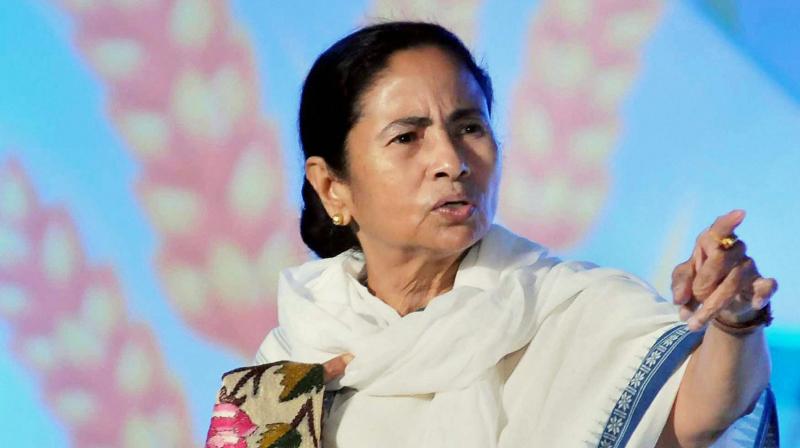
Bengal: 'Joy Bangla' is now TMC’s answer to BJP’s 'Jai Shri Ram'

In West Bengal ‘Joy Bangla’ is trying to blare out ‘Jai Shri Ram’ as a bruised and battered Trinamool Congress (TMC) is trying to fan Bengali sub-nationalism to take on BJP’s Hindutva challenge.
To counter the saffron brigade’s most popular greeting, which the TMC sees as a construct of Hindi heartland, the party supremo Mamata Banerjee urged her workers and supporters to greet each other with ‘Joy Bangla’ and ‘Jai Hind.’
Incidentally, ‘Joy Bangla’ was the war cry of the Mukti Bahini that fought the Bangladesh Liberation War in 1971 and since then it has become almost synonymous with Bengali nationalism.
The ‘Jai Hind’, the popular slogan and greeting of the Indian National Army led by Subash Chandra Bose, on the other hand, is a symbol of India’s unity and strength.
By appropriating these two seemingly competitive slogans, the TMC is trying to walk dangerously on a tight rope. The objective, overtly at least, is to attack at the RSS-BJP’s core idea of India as a strong homogenous nation, as against the concept of it (India) as a country of many nations.
Thus, in the TMC’s scheme of things the Bengali sub-nationalism represented by ‘Joy Bangla’ is not in contradiction with Indian nationalism represented by ‘Jai Hind.’ Rather, they are complementary to each other.
The concurrent loyalty to two separate identities was the hallmark of nationalist movement of Bengal and for that matter the entire country during the freedom struggle, as pointed out by a senior TMC leader.
He cited that two songs of Rabindranath Tagore Jana Gana Mana Adhinayaka Jayahe, which hailed Indian nationalism and Amar Sonar Bangla, Ami Tomay Bhalobasi, which appeals to Bengali sub-nationalism, are the examples of the compatibility of two identities.
Two TMC squads to take on RSS
To take on the growing influence of the BJP’s ideological fountainhead, the Rashtriya Swayamsevak Sangh (RSS), the TMC at its core-committee meeting on Friday formed Jai Hind Bahini and Bongo Jononi Bahini in a bid to create a counter narrative to BJP’s brand of Hindutva-driven nationalism.
“Members of these forces will be given uniforms and identity cards. And they will be steeped in the culture of Bangla. They will follow the ideals of Netaji (Subash Cahndra Bose),” Banerjee said.
Political Compulsion
Riding piggyback on its Hindu nationalism, the BJP in the just concluded Parliamentary elections recorded nine-fold increase in its Lok Sabha tally in Bengal, despite Mamata Banerjee explicitly playing Hindu cards chanting Vedic slokas and drumming her religious identity during the poll campaigns.
Desperate to regain its lost ground, the TMC is hoping that the Bengali identity-card could be the only quick-fix solution to the crises it’s facing. The hypothesis got currency after BJP lost in all the nine seats where elections were held in the last-phase on May 19, just days after the saffron party’s workers allegedly vandalized a bust of a prominent icon of Bengali renaissance Ishwar Chandra Bandyopadhyay in the heart of Kolkata city.
The TMC had termed the incident as an attack on Bengali culture by some “Hindi-speaking goons” brought by the BJP from outside.
“There are many Hindi-speaking people here. But a few Hindi-speaking goons of the BJP came from other states and created trouble. The administration was under the Election Commission at that time. You all have tolerated a lot of atrocities,” Banerjee reiterated at a meeting at Naihati on Thursday (May 30).
The TMC, however, is aware that its Bengali identity card could prove counter-productive and even draw the wrath of the Centre if it’s seen as too radical and secessionist, hence the careful interplay of two identities.
It is essentially an attempt to camouflage its narrow regional push under a lofty ideology of multi-nationalism, akin to BJP’s attempt to hard-sell one culture, one language in the pretext of hyper-nationalism.
If unchecked, this clash of ‘Joy Bangla’ with ‘Jai Shri Ram’ will only push the state into a vortex of competitive radicalism.


